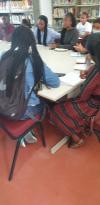Investigadora: Mónica Frederico
Período: 2015-2018
Financiamento: Programa Desafio (Formação)
Abstract do projecto: Pregnancy and abortion among adolescents are an important public health concerns that contribute to maternal morbidity and mortality. However, it goes beyond public health and also has social and economic consequences, e.g. school drop-out. It is recognized that more adolescents engage in sexual activity early, but many girls do not take precaution to prevent pregnancy or lack knowledge to do so. In Mozambique, the availability and knowledge of contraception methods are increasing among adolescents (15-19 years). However, contraception use among sexually active adolescents is still very low (15.1%) (DHS, 2011) resulting in a high adolescent fertility rate. In the DHS from 2011 71.3 % of adolescents aged 19-year-olds report having had a baby or be pregnant. Data on induced abortion are mainly hospital based and indicate that abortion- related deaths among adolescents represent 11-18% of all hospital-based maternal deaths. However, the real prevalence is probably much higher, because many cases of abortion are not present at health services. Furthermore, we do not have insights in the context in and decision-making process through which the decision to terminate pregnancy occurs. To close these gaps, we would like to conduct this research. The findings of this study will contribute to informing the policy makers on the magnitude and implication of induced abortion among adolescents, and influence them to improve effective strategies to reduce cases of (unsafe) induced abortion. The Overall objective of this Study is to understand induced abortion practices in communities in Mozambique. Quantitative and qualitative methods will be applied
Palavras-chave: pregnancy; abortion; adolescentes, Maputo;Quelimane













